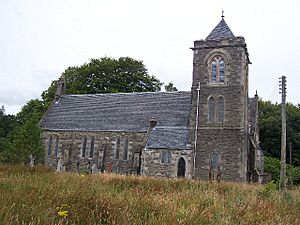Holy Trinity Church, Dunoon facts for kids
Quick facts for kids Holy Trinity Church |
|
|---|---|

The church in 2005
|
|
| 55°56′46″N 4°56′23″W / 55.946156°N 4.939598°W | |
| Location | Dunoon, Argyll and Bute |
| Country | Scotland, United Kingdom |
| Denomination | Episcopalian |
| Website | Official website: https://www.holytrinitydunoon.co.uk/ |
| History | |
| Status | open |
| Consecrated | 11 September 1850 |
| Architecture | |
| Functional status | used |
| Heritage designation | Category B listed building |
| Designated | 20 July 1971 |
| Architect(s) | John Henderson |
| Architectural type | Gothic Revival |
| Groundbreaking | 1849 |
| Completed | 1850 |
Holy Trinity Church is a special church building in Dunoon, Scotland. It belongs to the Episcopalian faith. You can find it on Kilbride Road, a little southwest of the town center.
The church was built in 1850. It was designed in the Gothic Revival style, which means it looks like old medieval churches. Because of its history and design, it is a Category B listed building. This means it is an important historical building in Scotland.
The first architect was John Henderson. Later, in 1896, Alexander Ross made the church bigger. The church's bell was made by a company called John Warner & Sons.
Contents
History of Holy Trinity Church
Early Days and Fundraising
In 1846, a minister named Revd. Henry George Pirie started holding church services. These services were for local Scottish Episcopalians in a hall in the town center. People then began to raise money to build their own church.
One famous person who donated money was William Ewart Gladstone. He later became the Prime Minister of Britain.
Building the Church
A piece of land was given for the church near an old well called St Bride well. An architect from Edinburgh, John Henderson, was chosen to design the church. The first stone of the church was laid on March 31, 1849.
In September 1850, the new Bishop of Argyll, Alexander Ewing, visited the church. He officially opened it for people to worship there. In 1882, a pipe organ was bought for the church.
Making the Church Bigger
By the 1890s, the church was not big enough, especially in the summer when more people visited. So, in 1894, architect Alexander Ross from Inverness helped to make it larger. The main part of the church, called the nave, was extended.
Later, more parts were added. These included a large entrance area at the front, called a narthex, and a tower with bells. Around 1950, the sanctuary, which is the area around the altar, was updated.
Modern Updates
For Christmas in 1944, electric lights were installed in the church. Naval personnel stationed nearby in Innellan helped pay for this. Later, in the late 20th century, an electric organ replaced the old pipe organ.
In 2013, a big project started to preserve and repair the church. This project received a lot of funding from Historic Scotland and the Heritage Lottery.
Rectors of Holy Trinity Church
Holy Trinity Church has had twenty rectors, who are like the main priests or ministers, throughout its history. Two of the most recent rectors became bishops. These were Andrew Swift, who became a bishop in the Diocese of Brechin, and David Railton, who became a bishop in the Diocese of Argyll and the Isles.
Graveyard Monuments
In the church's graveyard, you can find monuments for important people. These include Alexander Reid, who was a well-known person in Scottish art history. There is also a monument for Sir Francis Powell, who was a famous Scottish watercolor painter.
Gallery
See also
- List of listed buildings in Dunoon
 | Kyle Baker |
 | Joseph Yoakum |
 | Laura Wheeler Waring |
 | Henry Ossawa Tanner |


